Track 1 By Singer Reimagined Is The World’s Most Advanced ‘Flat 6’ Chronograph: It Might Not Sound Like An Air-Cooled 911, But It Sure Laps Like One! (Updated)
by Ian Skellern
Serendipity: it’s a rare event when the stars align, rarer still when they align to create what may well become a truly iconic chronograph.

Singer Reimagined Track 1 on the wrist
In fact, the Singer Reimagined Track 1 may already be a truly iconic chronograph: it certainly has both the pedigree and the style. And more importantly for an icon, the Track 1 looks like it’s been around since the 1970s.
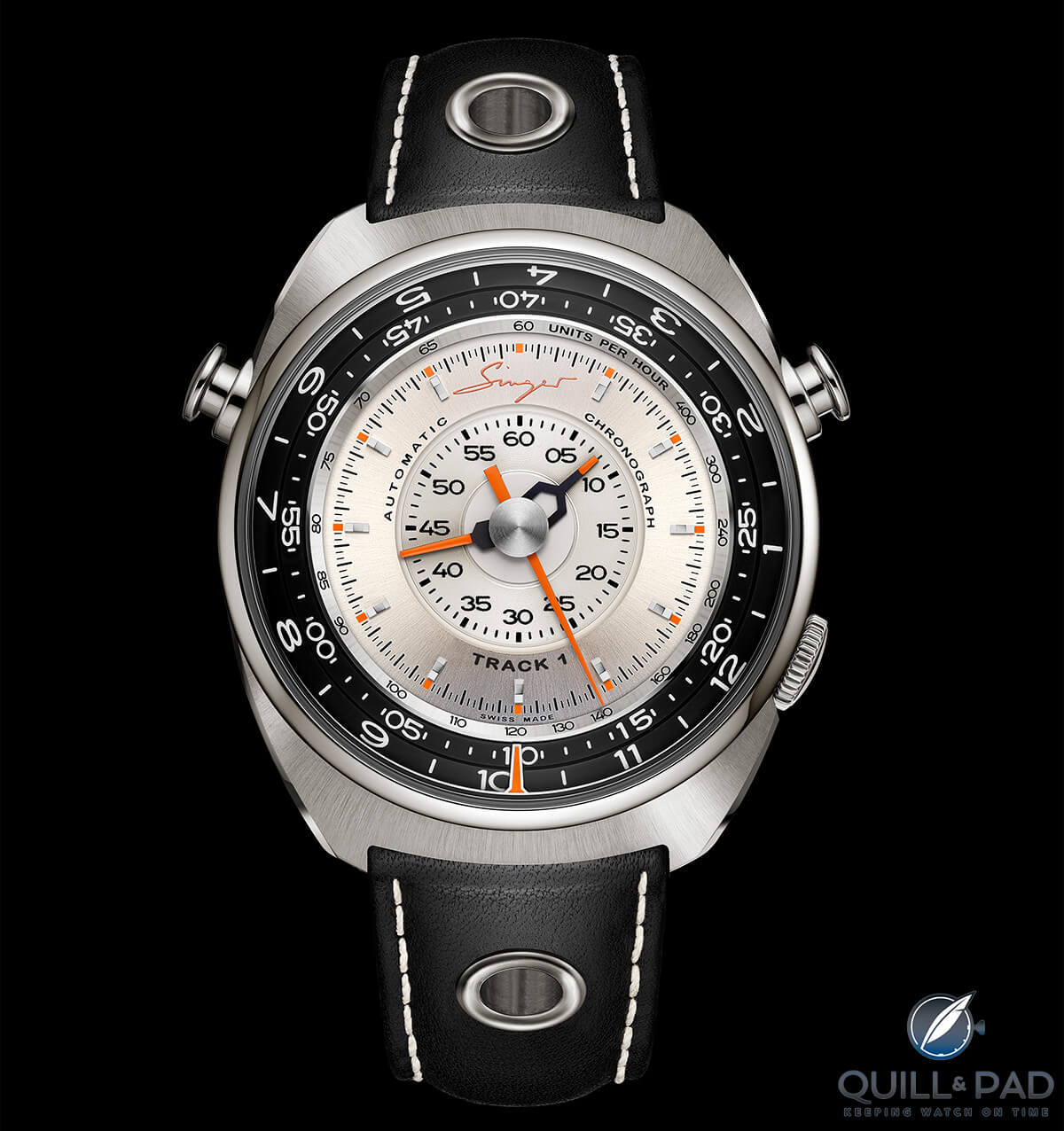
Track 1 chronograph by Singer Reimagined
Time is indicated at 6 o’clock by rotating hour and minute disks, so it’s easy to read while driving without having to move your hand from the wheel, and the central coaxial chronograph indications are among the most legible chronograph displays I’ve ever seen.
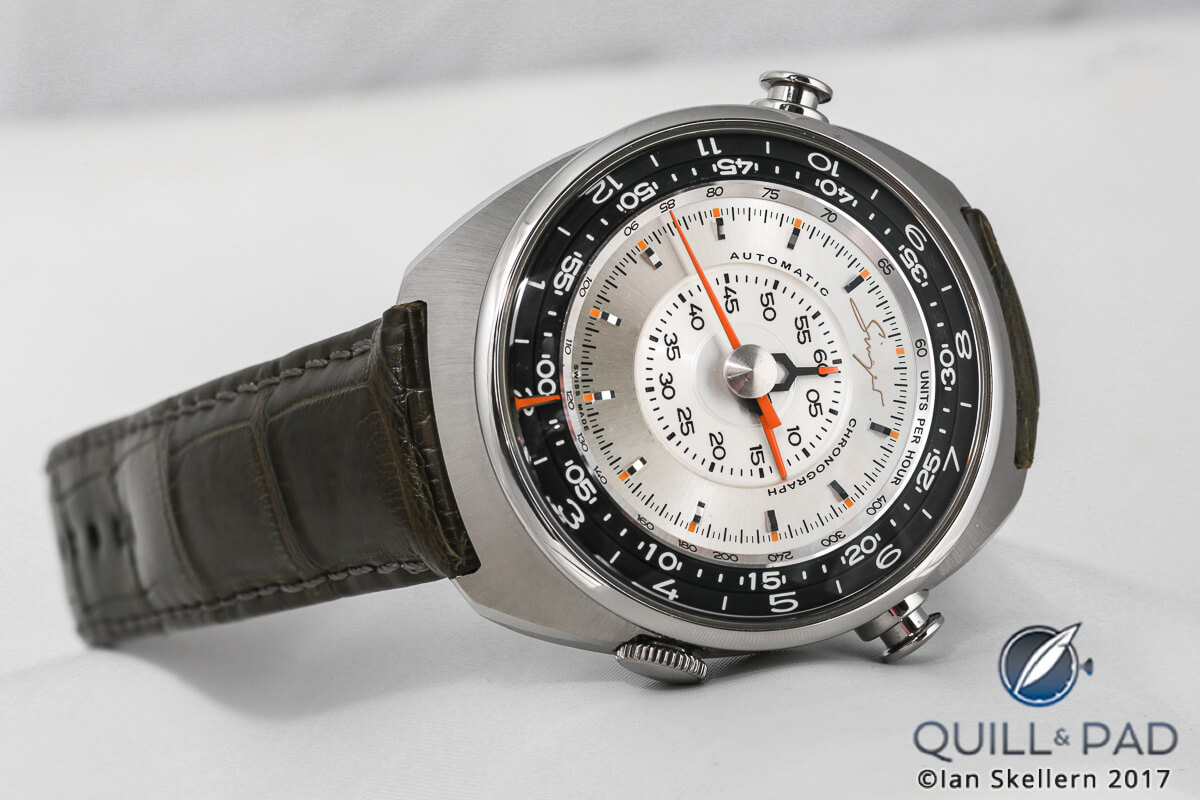
Track 1 chronograph by Singer Reimagined
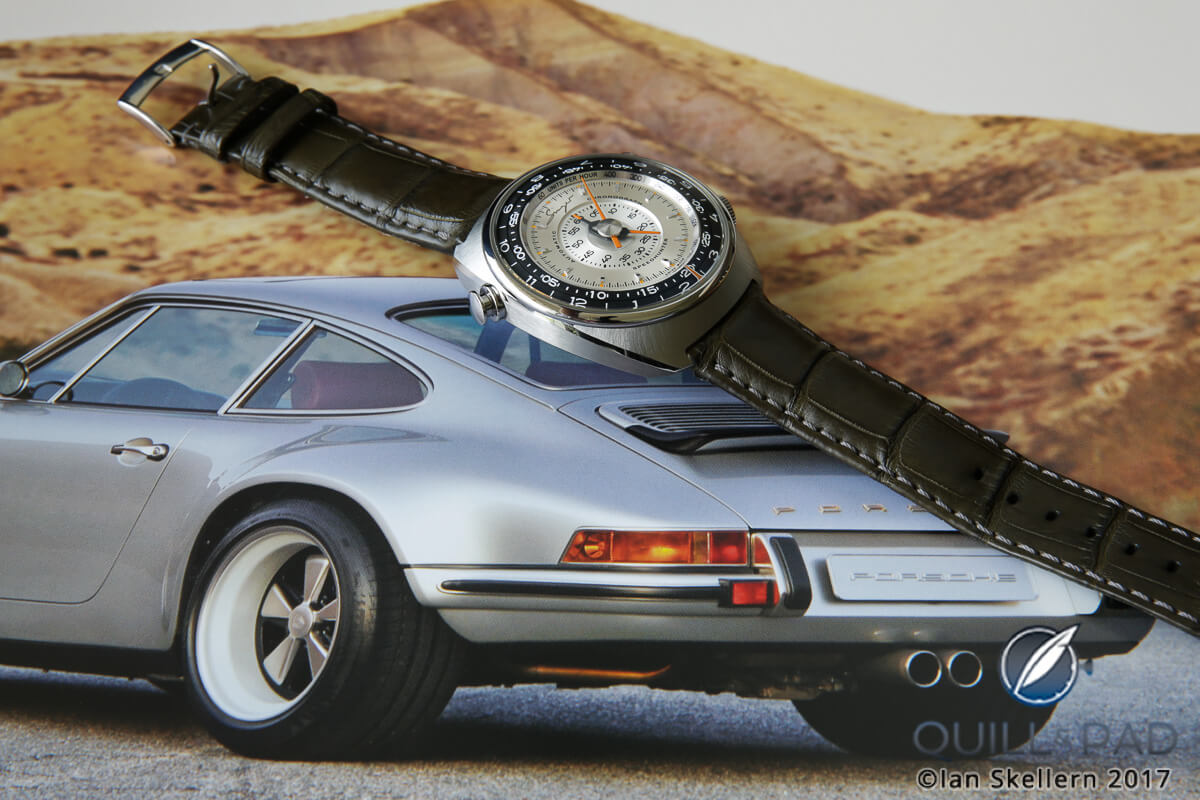
Singer Reimagined Track 1 chronograph (background photo from the book ‘More Than 10’)
And then there’s that cool 1970s look, which while not inspired by a classic Porsche 911 − that would be too derivative − is inspired by the philosophy of Singer Vehicle Design, which takes iconic Porsche 911s from 1989 through 1994 and transforms them into relatively understated modern supercars.
Marco Borraccino: designer
As a watch designer, Marco Borraccino has form, serious horological form. Growing up in Milan, Borraccino fell in love with both cars and design. He turned his passion into a career encompassing high-level positions as successive head of design for Proctor & Gamble (P&G) in Geneva and Officine Panerai in Milan.
In 2009, Borraccino quit the corporate world and set up his own independent design consultancy in Geneva with a focus on watch design for Swiss brands.

He was also instrumental in the creation and management of the first Chair of Watch Design in Switzerland at HEAD, the Geneva Design University.
Like many Porsche enthusiasts, Borraccino was impressed by the work Singer was doing in transforming classic 911s. He casually dropped Singer founder Rob Dickinson an email expressing his appreciation.
More emails followed and a friendship bloomed.
Rob Dickinson: Porsche 911 restorer
Rob Dickinson grew up in Norfolk in the northeast of England. Like Borraccino, he turned his passion for fast cars (especially 911s) and design into a career. He studied design at university and worked at Lotus, the renowned British sports car manufacture.
But Dickinson has a second passion in music, and he left the automotive world and became singer/songwriter for the British alternative rock band Catherine Wheel (1990-2000).
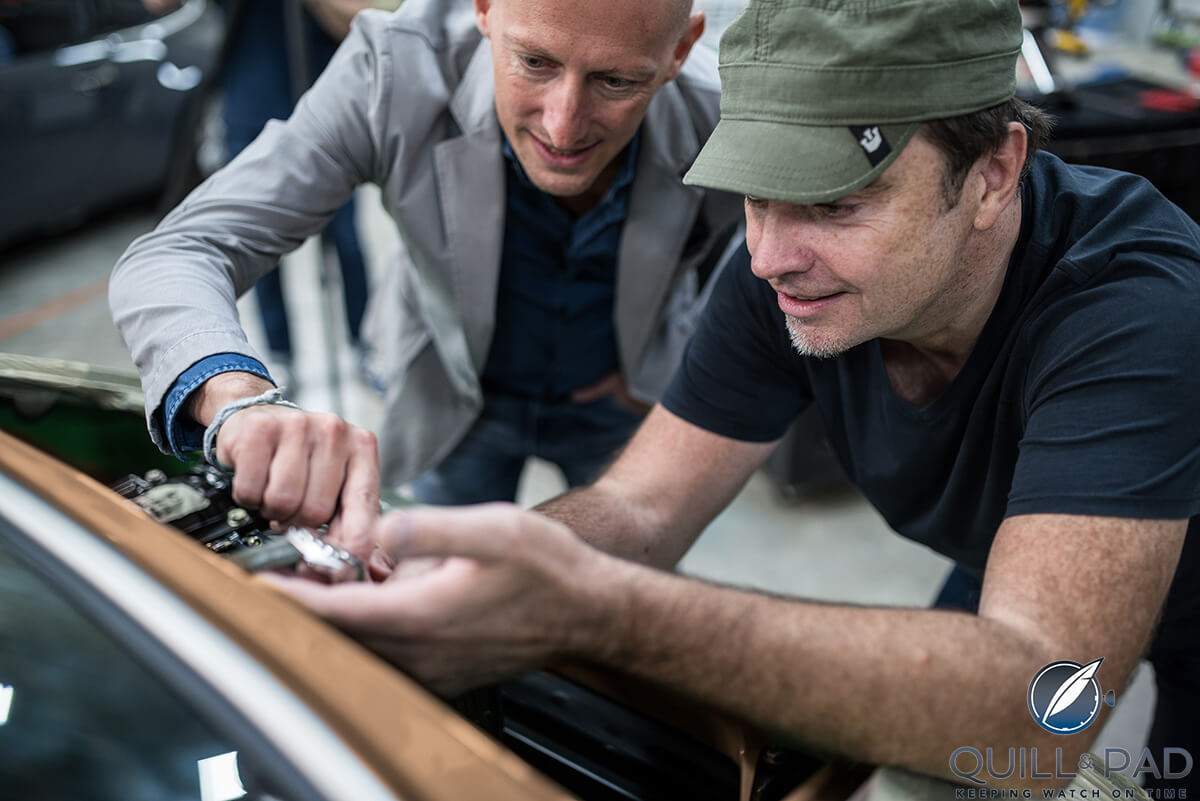
Marco Borraccino (left) and Rob Dickinson
After Catherine Wheel broke up, Dickinson, by this time living in California, returned to the automotive world by restoring and transforming a classic 911 into his dream Porsche. Others saw his car, liked what he did, and asked him to make one for them. In 2009, Singer Vehicle Design was born.
It can’t be stressed enough that a Singer 911 isn’t simply a restored classic. Singer’s tagline is “Restored, Reimagined, Reborn.” While each commission begins with a 1989-1994 vintage 911 964, by the time Singer is finished after 118 months, there is barely a component that hasn’t been replaced with something better. The engine is upgraded, chassis strengthened, and the body replaced with carbon fiber panels. Even the electronics and lighting are replaced by the very best modern systems available.
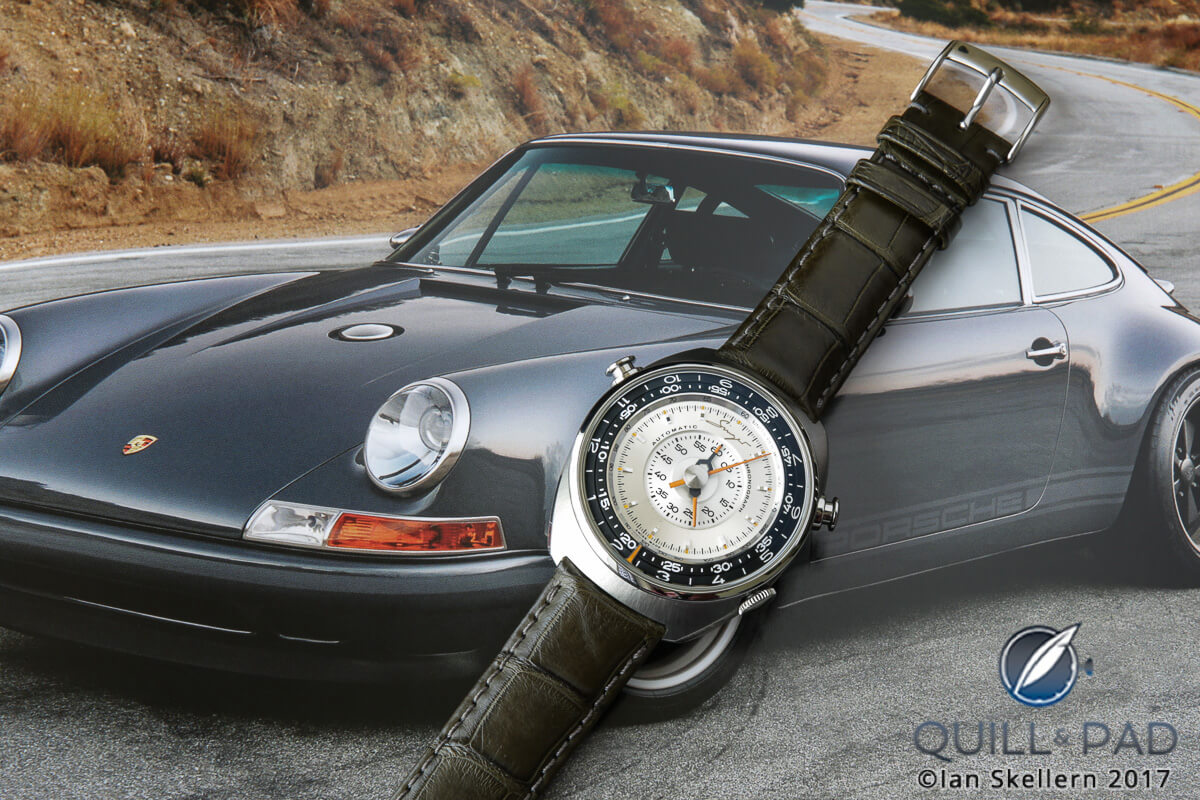
Singer Reimagined Track 1 chronograph (background photo by Antonio Alverdia from the book ‘More Than 10’)
That level of quality and meticulous attention to detail comes at a cost: a Porsche restored by Singer is unlikely to leave the owner much change (if any) from half a million U.S. dollars.
Note: the name Singer comes from Dickinson’s time with Catherine Wheel. And, serendipitously, one of the (if not THE) most successful Porsche racing engineers of all time is a gentleman named Norbert Singer.
For more on Singer Reimagined’s outrageously perfect 911s, there is a link to an excellent article in Road & Track by Sam Smith at the bottom of this article.
The story so far: two’s lucky . . .
That first email between Borraccino and Dickinson led to a year of sharing views on a mutual appreciation of cars, music, and watches – particularly the iconic classic sports chronographs of the 1960s and ’70s. They began discussing creating a watch brand together, whose initial requirements would include the first watch having to be a chronograph to relate to motorsports. And that it would have to be a very special chronograph. Singer is all about the exceptional, and a Singer watch would reflect that in every way.
Dickinson started working on a variety of possible chronograph designs and talking to movement and component suppliers, but quickly ran into two immutable facts: starting from an existing chronograph movement severely limited the potential for the design to be as different as Dickinson and Borraccino would like, and developing a brand-new chronograph movement − especially a radical new chronograph movement − would be prohibitively expensive for a tiny start-up brand.
But then, serendipity stuck again.
Three’s a charm: Jean-Marc Wiederrecht and Agenhor
Early in 2016, Borraccino had a meeting with Agenhor founder Jean-Marc Wiederrecht to discuss the project. It’s worth bearing in mind that at this stage nobody knew that Agenhor was developing a chronograph movement.
Borraccino showed Wiederrecht a few of his proposed designs including one (seemingly impossible to realize) with central chronograph indicators. Wiederrecht’s jaw dropped as he asked how Borraccino could possibly know about Agenhor’s top-secret chronograph movement featuring central coaxial chronograph indications.
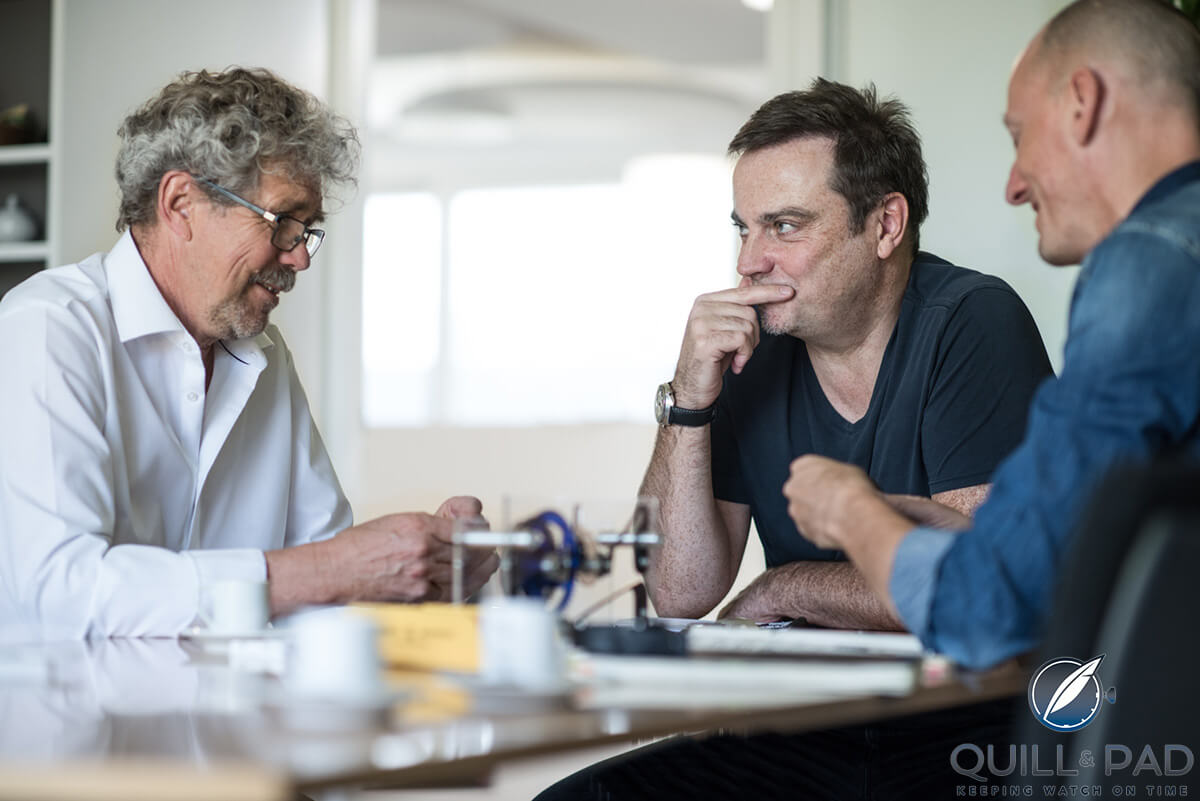
Reimagining the chronograph: Jean-Marc Wiederrecht, Rob Dickinson, Marco Borraccino
As with both Borraccino and Dickinson, Wiederrecht has serious pedigree: he won the inaugural Best Watchmaker award at the 2007 Grand Prix d’Horlogerie de Genève as well as a multitude of international awards with Agenhor for watches developed for innovative timepieces for brands including MB&F, Fabergé, Hermès, Harry Winston, Van Cleef & Arpels, and many more.
Agenhor’s secret weapon: the AgenGraphe chronograph
Geneva-based complication and movement developer Agenhor had been developing a revolutionary chronograph movement for more than ten years and was only 12 months or so from being ready to launch at that point.
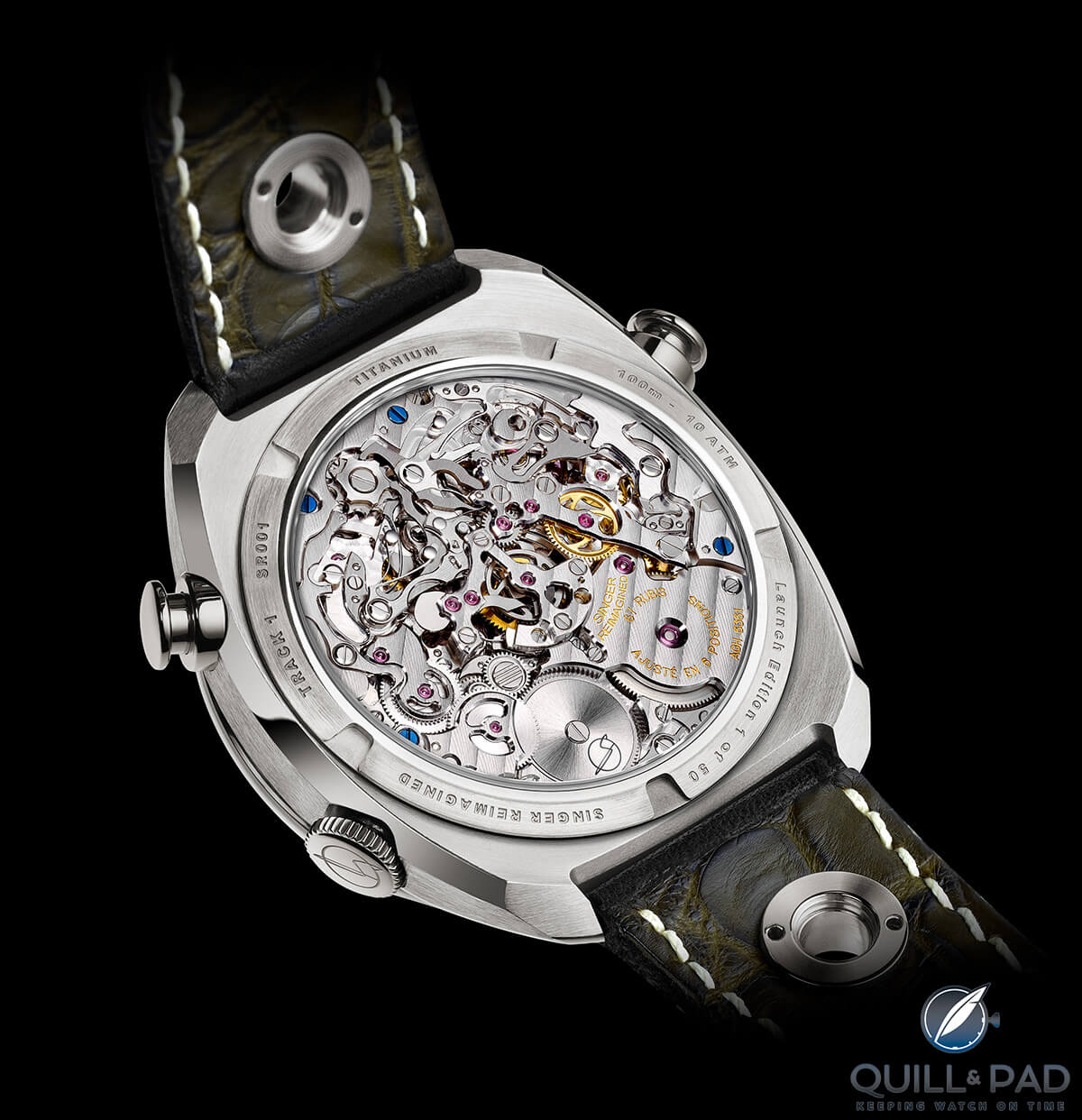
Singer Reimagined Track 1 movement side
Called the AgenGraphe, the new chronograph resolved virtually all of the problems traditional chronograph mechanisms had, including:
- poor legibility due to small subdial counters
- poor legibility due to reading elapsed time over multiple subdials
- poor legibility due to analog hour and minute counters
- stutter from horizontal clutch
- vertical clutch takes more space, more expensive, harder to service
- inconsistent power requirements lead to poor precision
- excessive pusher force leads to increased wear
- reset shock leads to increased wear
- automatic winding rotor conceals appreciation of movement
- automatic winding movements are relatively noisy
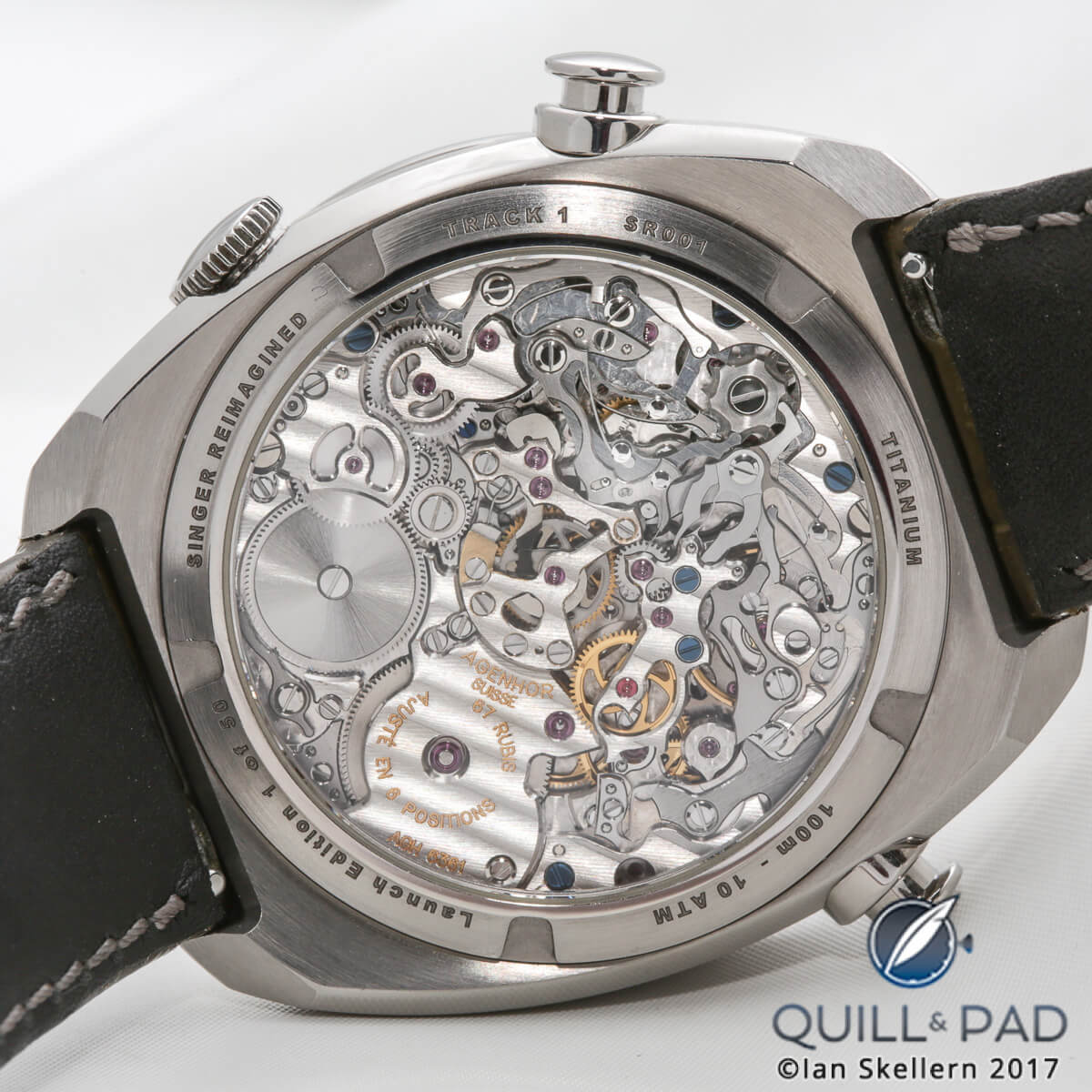
View through the display back of the Singer Reimagined Track 1 to the AgenGraphe movement within
The AgenGraphe not only solves all of the issues above, which are inherent in the vast majority of traditional chronographs, it allows for large, highly legible central coaxial chronograph hands, just as envisaged by Borraccino but discounted as the expense of developing such a radical movement was far beyond his resources.
For more on the AgenGraphe, see The AgenGraphe By Agenhor: The Most Significant Chronograph Since . . . The Invention Of The Chronograph.
The AgenGraphe movement allowed Borraccino and Dickinson to design the chronograph of their dreams.
Track 1 by Singer Reimagined
While the vast majority of chronographs are probably more worn as a lifestyle statement than used as timing tools, the Singer Track 1 is first and foremost a chronograph that is designed to be used.
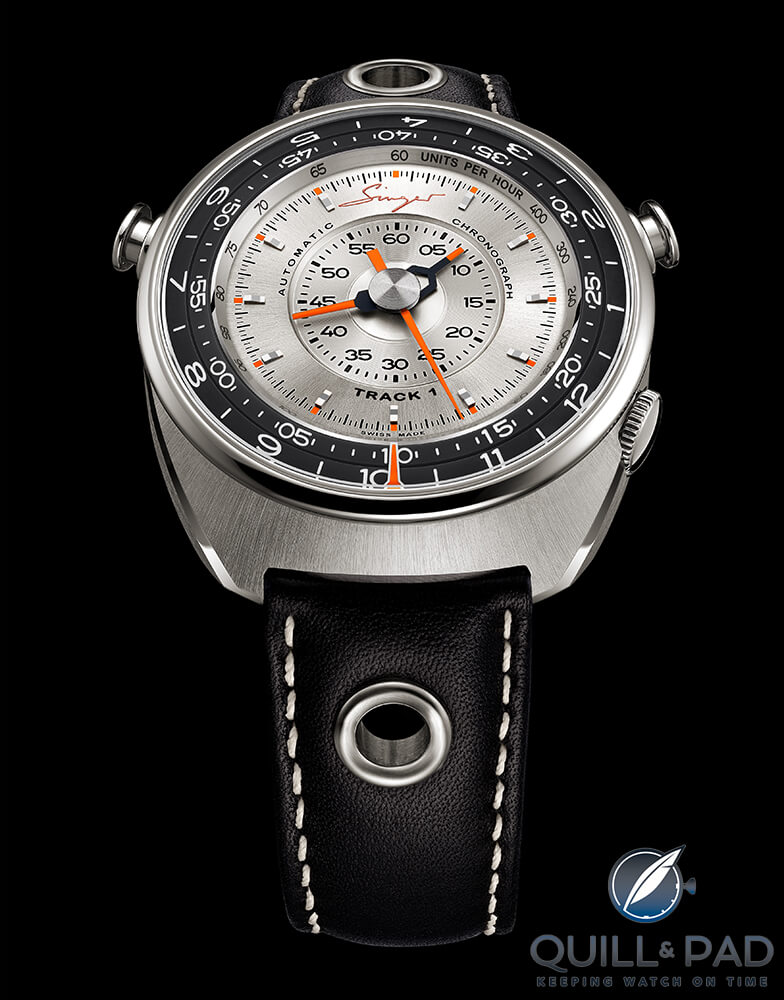
Singer Reimagined Track 1, the automatic winding rotor is under the dial
Track 1 is also a driver’s watch in that the rotating black hour and minute disks in aluminum display the time at 6 o’clock, the most ergonomic place to see the time without having to move your hand on the wheel. The time is displayed by large, high-contrast, white-on-black numerals that are easy to read when you need them but don’t distract when you don’t.
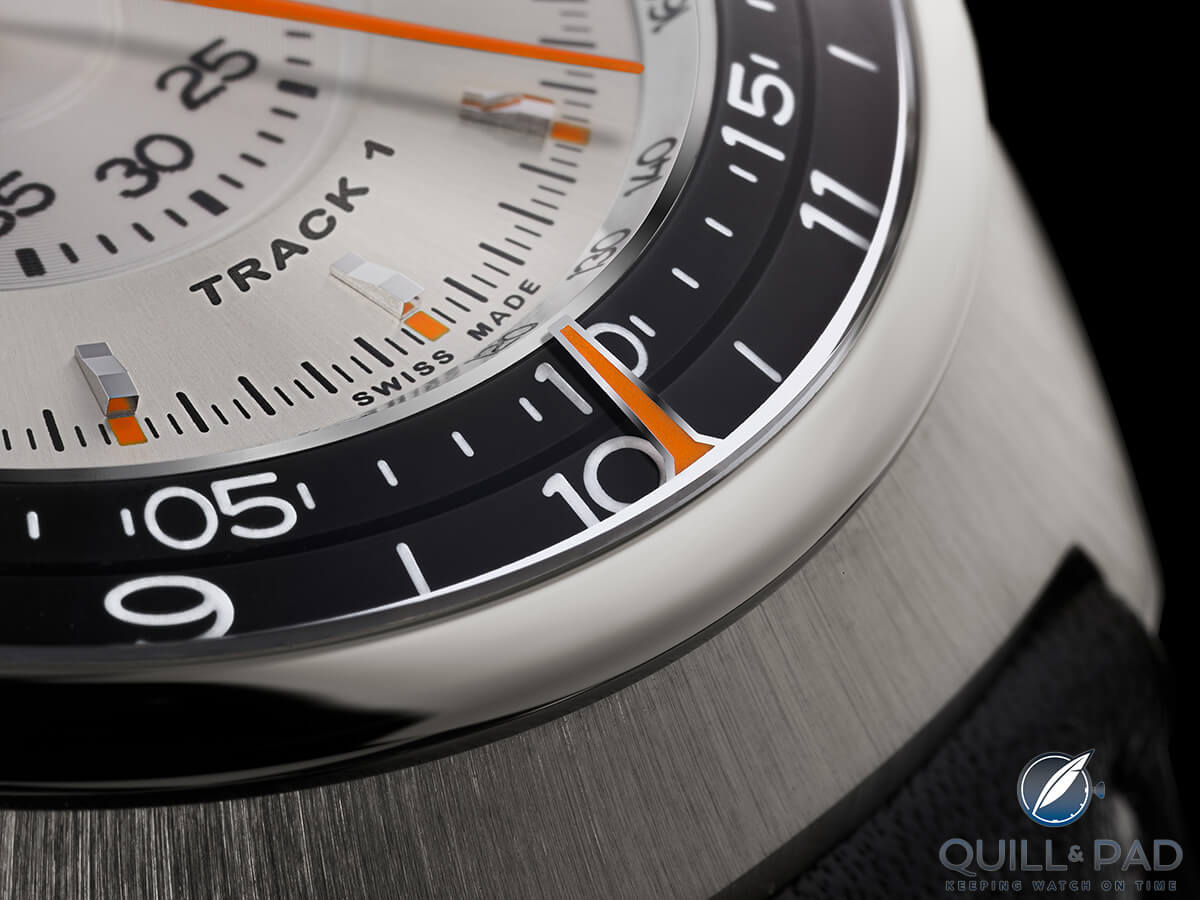
A close look at the hour and minute disks of the Singer Reimagined Track 1
It’s the chronograph display, though, that is really the focus of the Track 1, both figuratively and literally. When not in use, the three chronograph hands line up at 12 o’clock, casually concealing the magic in store. Activating the mushroom-shaped pusher at 2 o’clock starts the long, bright orange second hand on its journey around the outer chronograph dial, where there’s also a tachymeter so you can convert that lap time into average speed.
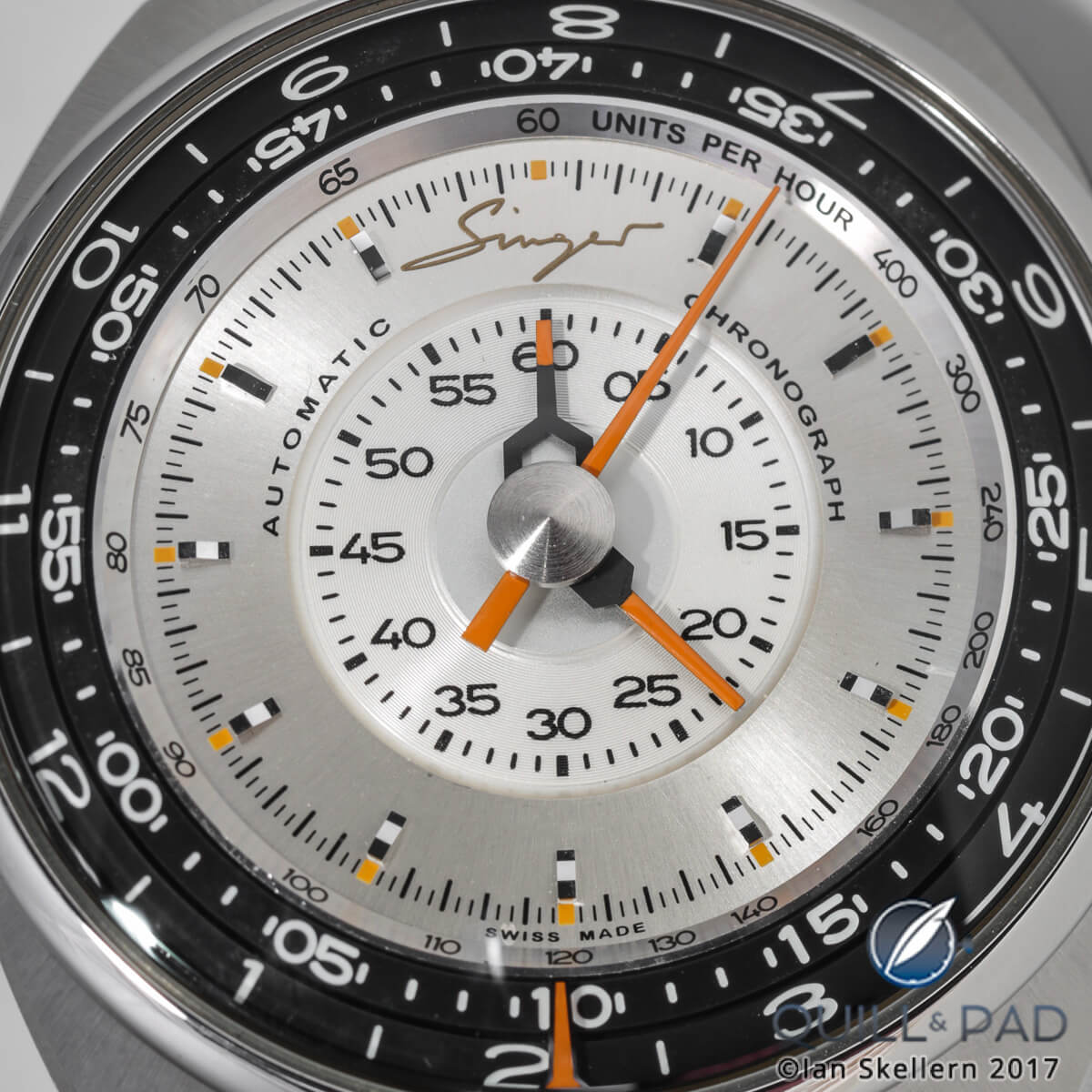
A close look dial side of the Singer Reimagined Track 1 chronograph
After 360 degrees, when the second hand reaches 12 o’clock, the minute hand instantly jumps one clear increment. After 60 minutes, the hour hand instantaneously jumps as well. The jumping minutes and hours ensure that there is absolutely no chance of mistaking if the hand is just before or just after 12 o’clock.
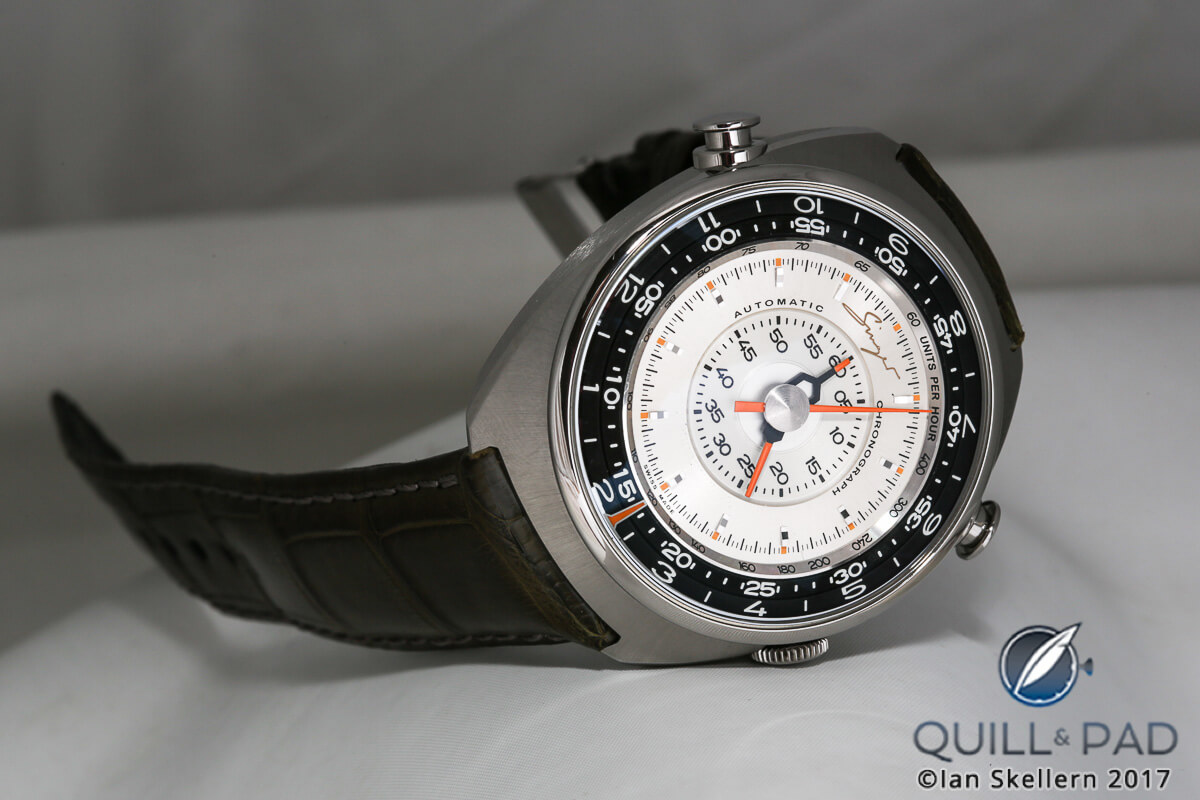
Singer Reimagined Track 1
The power for the jumps of the hour and minute hands is constantly supplied by the rotating cam of the second hand so there are no widely varying power spikes during the jumps that would adversely affect timing precision. The energy requirements for the chronograph are also minimal.
Dual mainspring barrels ensure a power reserve of more than 60 hours. That’s 60+ hours with the chronograph running so you can time the qualifying for the 24 Hours of Le Mans and the race itself without winding.
It’s worth noting that that 60-hour power reserve enables a 60-hour chronograph counter, which in turn means that both the chronograph hour and minute hands can share the same 0-to-60 chapter ring, which in turns means a cleaner and clearer dial, further enhancing legibility.
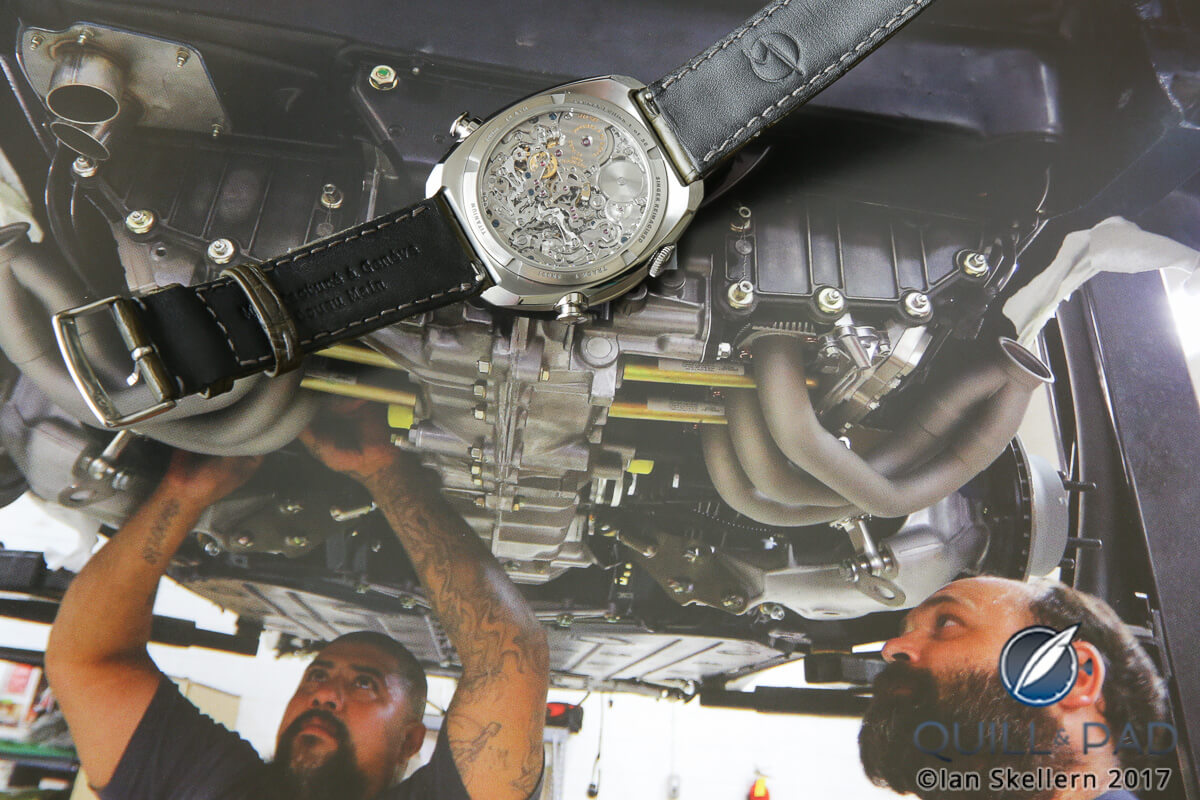
Singer Reimagined Track 1 chronograph (background photo by Antonio Alverdia from the book ‘More Than 10’)
Subtle hints of the 911
As I mentioned earlier, the Track 1 isn’t trying to be a 911 on the wrist, but there are a couple of discreet tips of the hat to the iconic Porsche: the small brushed aluminum disk in the center of the chronograph hands is inspired by a similar disk in 911 gauges, and the curves of the case from the lipped bezel down to the integrated lugs reflect the elegant lines on the body of the 911.
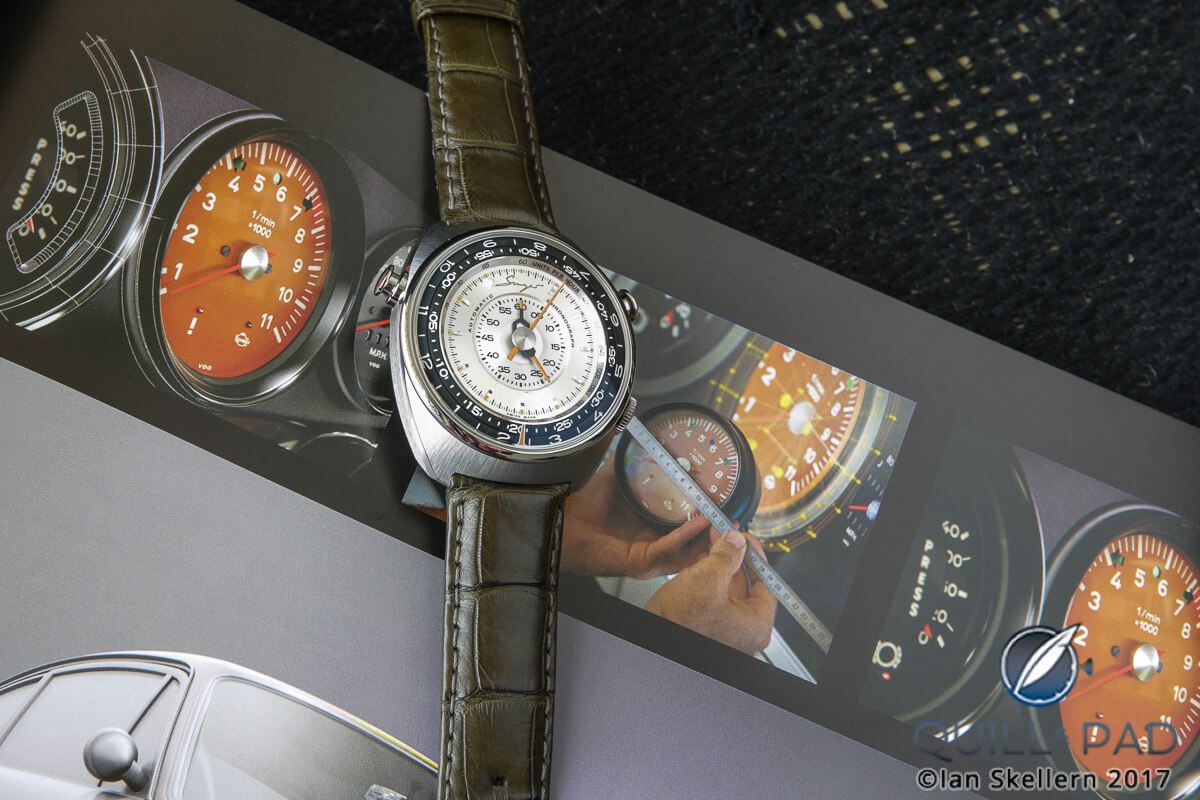
Note the center of the 911 gauges and the center of the Singer Reimagined Track 1 chronograph (background photo from the book ‘More Than 10’)
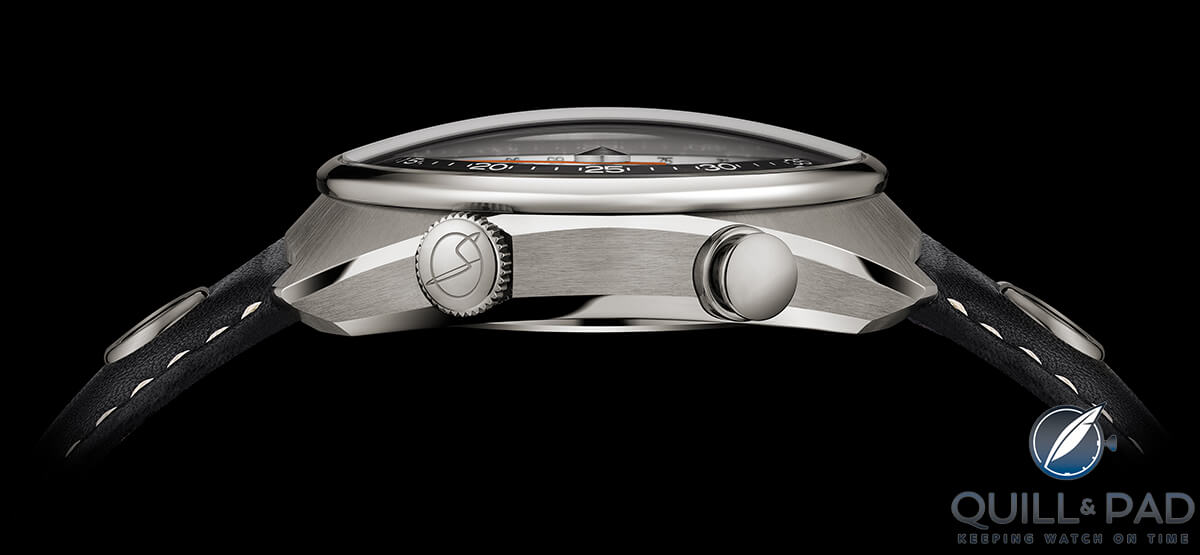
Beautiful 911-inspired curves of the Singer Reimagined Track 1 case
The chronograph start, stop, and reset pushers are on opposite sides of the case, reflecting the layout of race car dashboard timers: form follows function.
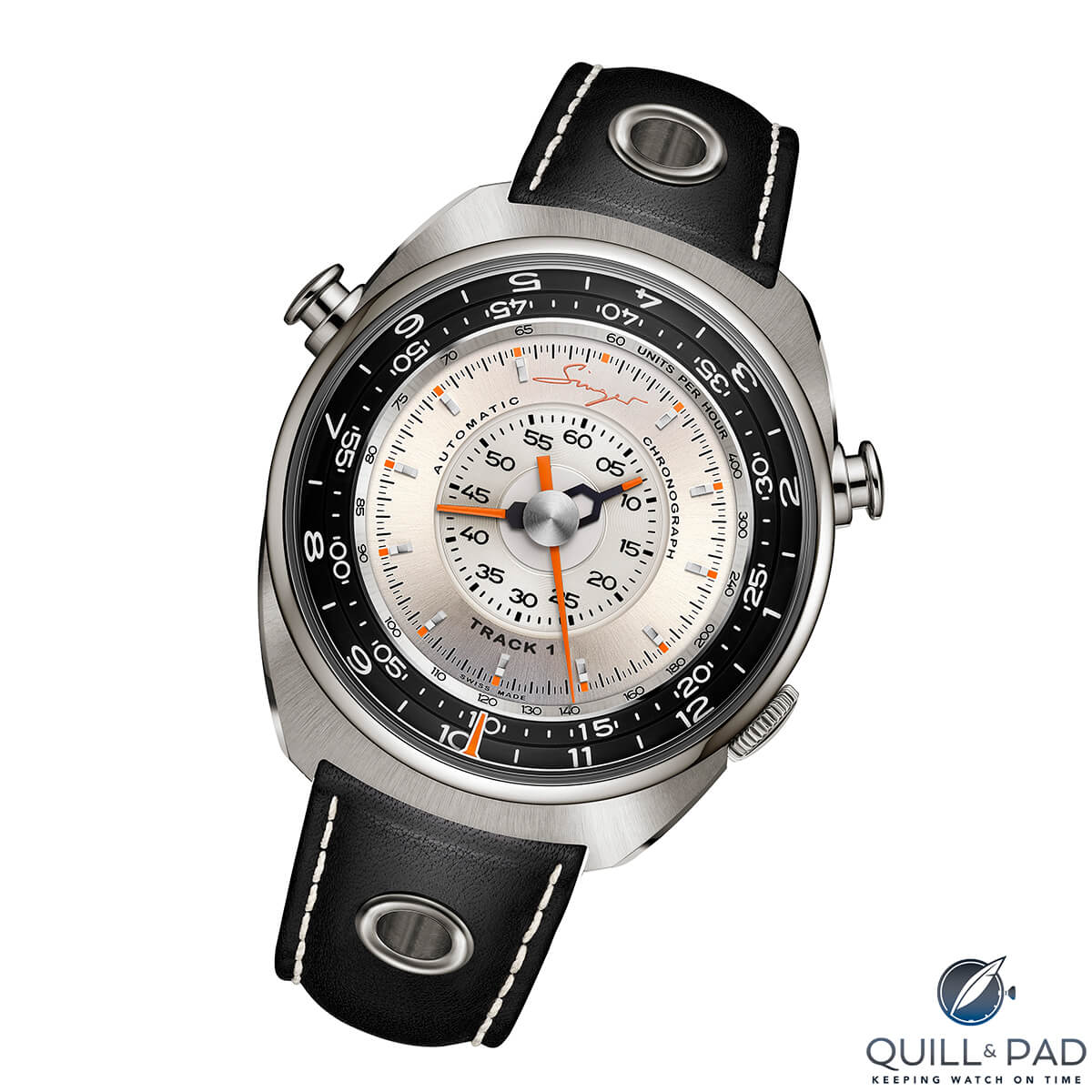
Singer Reimagined Track 1
It’s worth highlighting another of the many technical benefits of the AgenGraphe movement here: the strength required to activate the pushers can be easily adjusted to that required by the size of the pusher. Those mushroom domes squeeze down as smooth as silk.
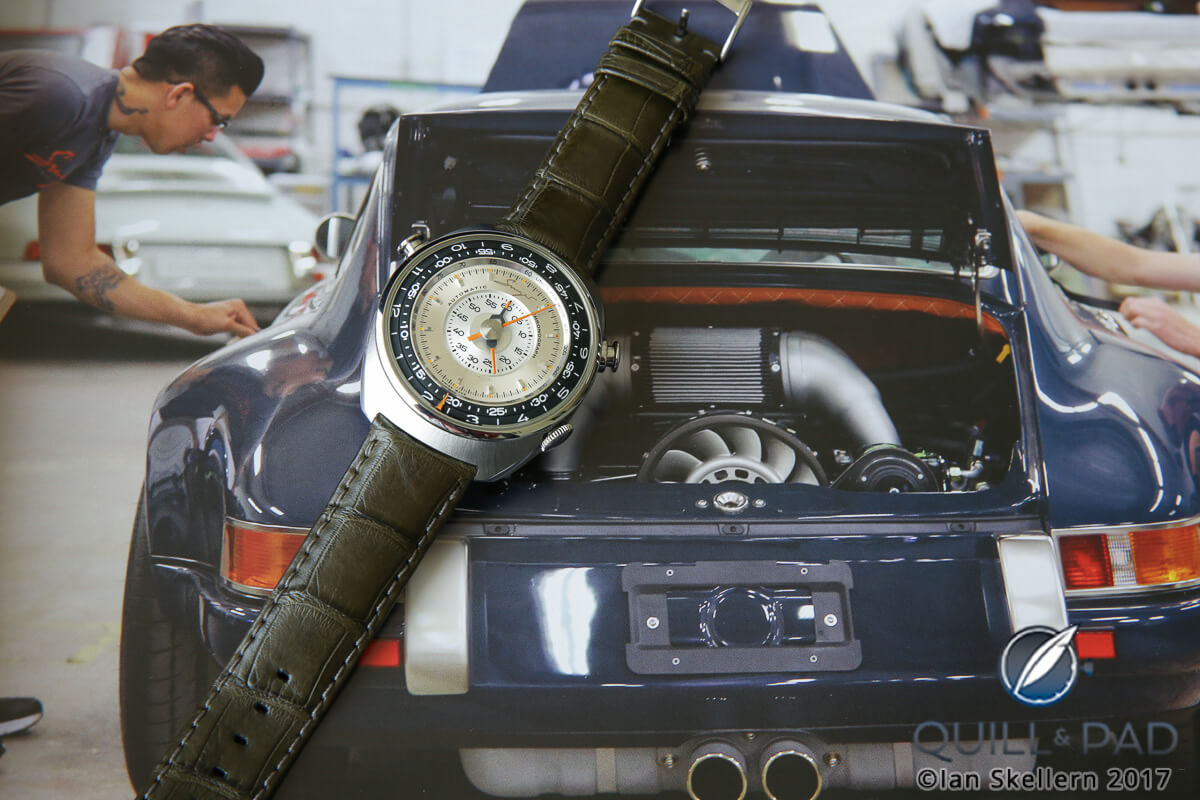
Singer Reimagined Track 1 chronograph (background photo by Antonio Alverdia from the book ‘More Than 10’)
A modern classic
The Singer Reimagined Track 1 isn’t just one of the two most technically advanced chronographs (the Fabergé Visionnaire Chronograph, which is also powered by the AgenGraphe movement, being the other), nor is it just a great looking chronograph in having pulled off an absolutely pitch-perfect modern retro look; this is a big call, I know, but I’m predicting that the Singer Track 1 will become a truly iconic chronograph, right up there with the TAG Heuer Monaco. The reason for my bold statement is that after a very short time with the Track 1 I felt that it had been around for decades.
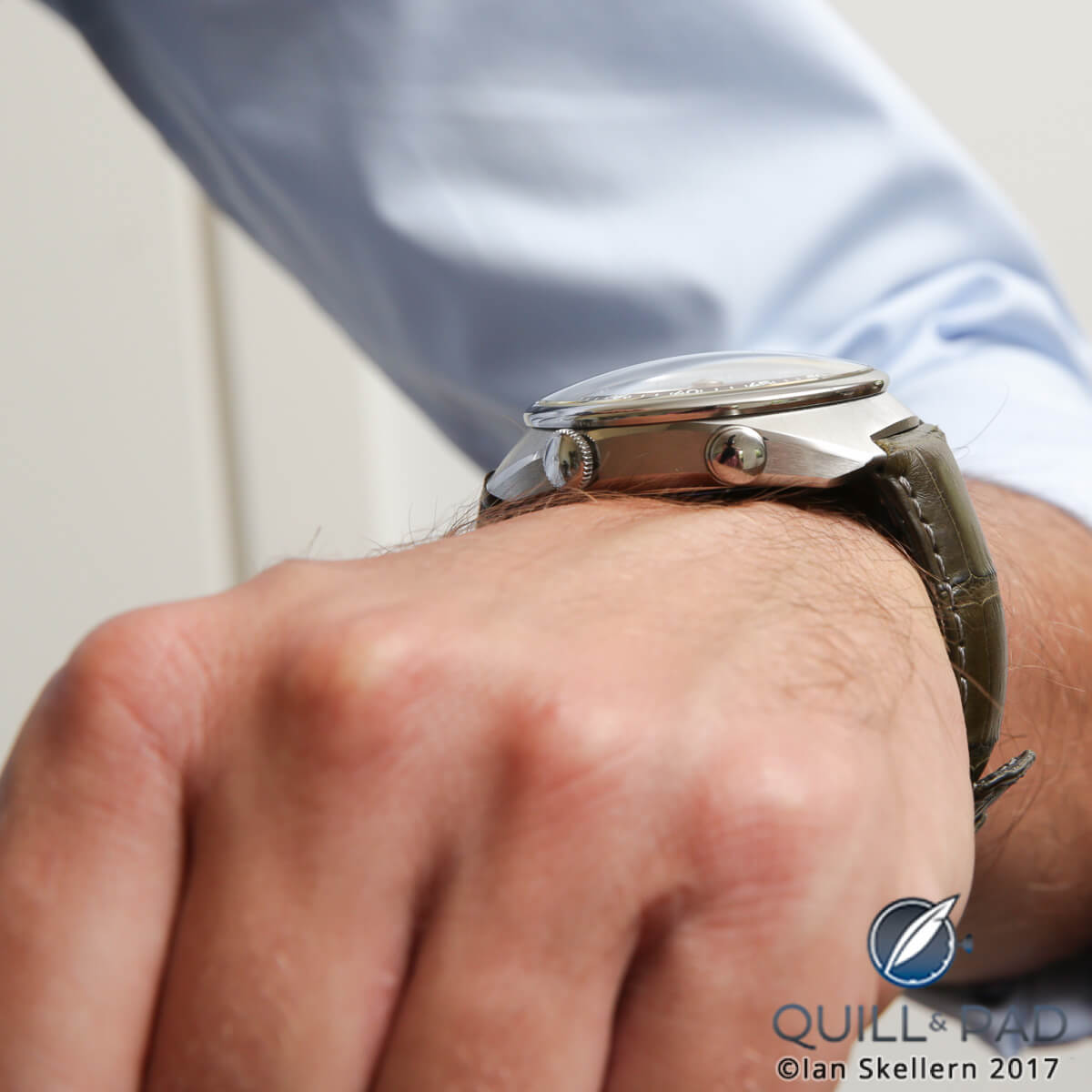
Singer Reimagined Track 1 on the wrist
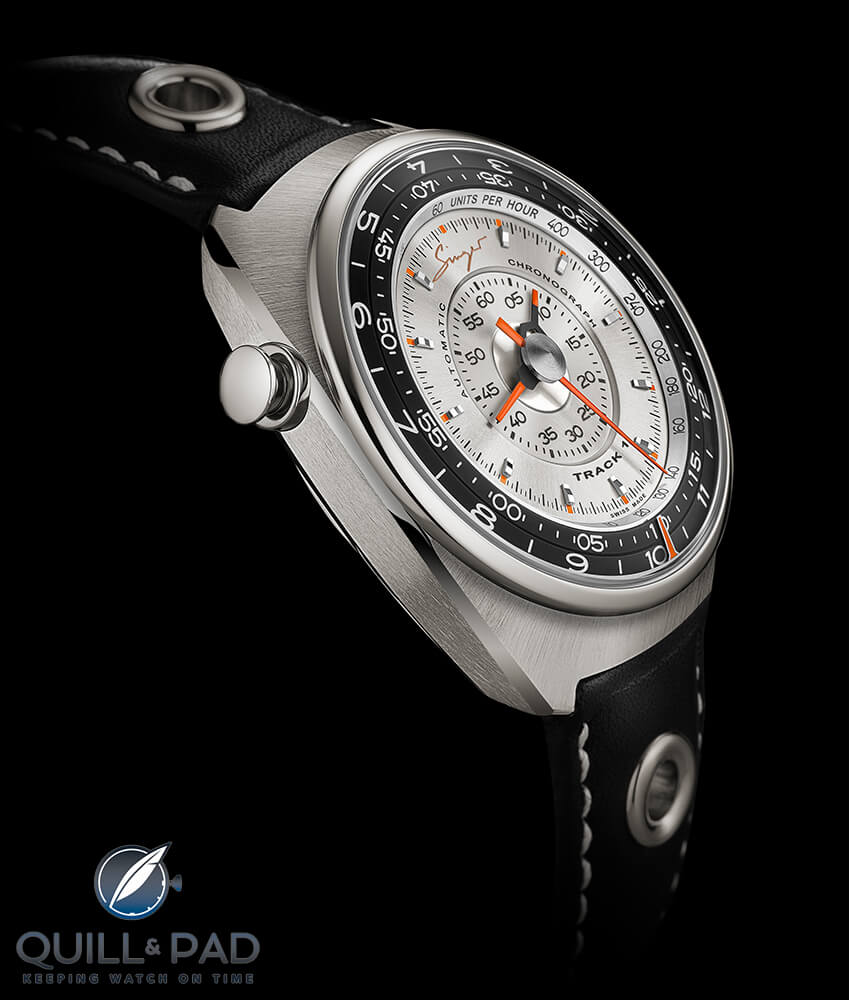
Singer Reimagined Track 1 chronograph
There’s no denying that the Track 1 is a contemporary watch with the very latest technology inside, but it’s the high performance coupled with easy comfort on the eye (and the wrist) that make the Track 1 truly timeless . . . just like a 911 reimagined by Singer.
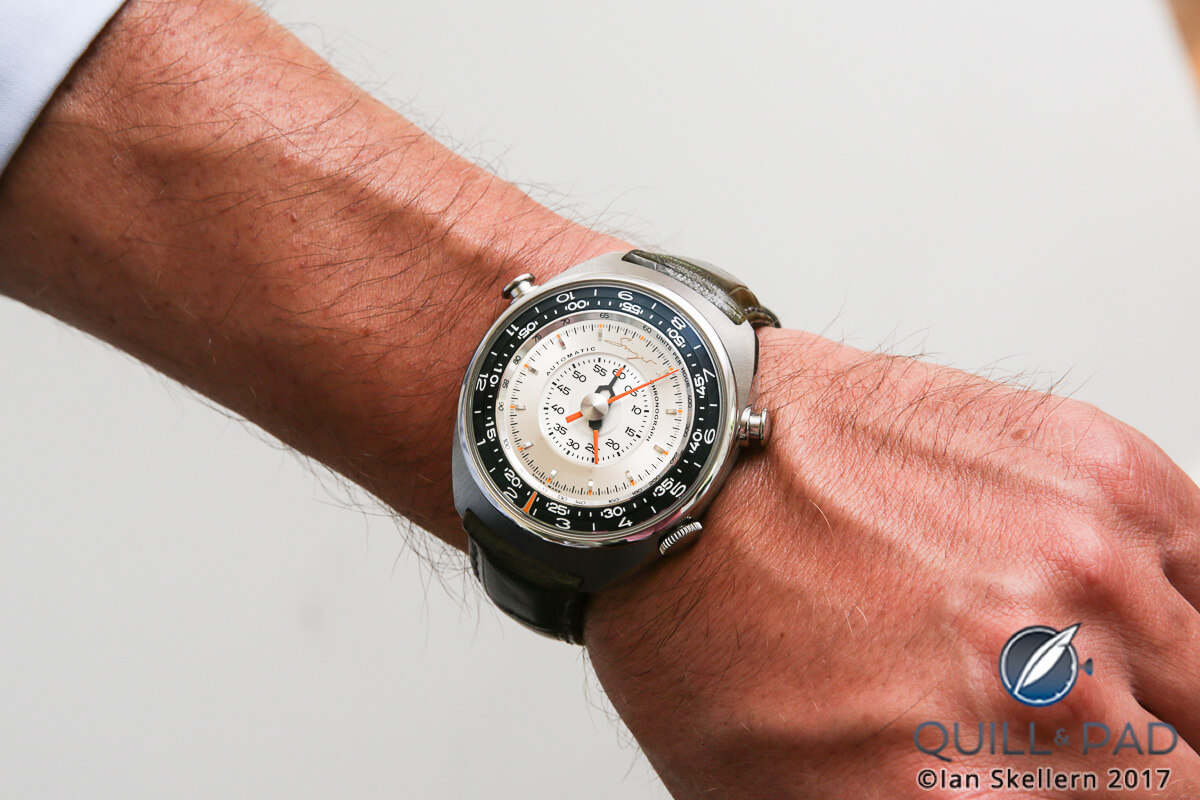
Singer Reimagined Track 1 on the wrist
*Update February 2018: After selling out of the Track 1, Singer Reimagined launched Track 1 Geneva Edition at the SIHH is a very eye-catchingly retro-look pale yellow gold case.
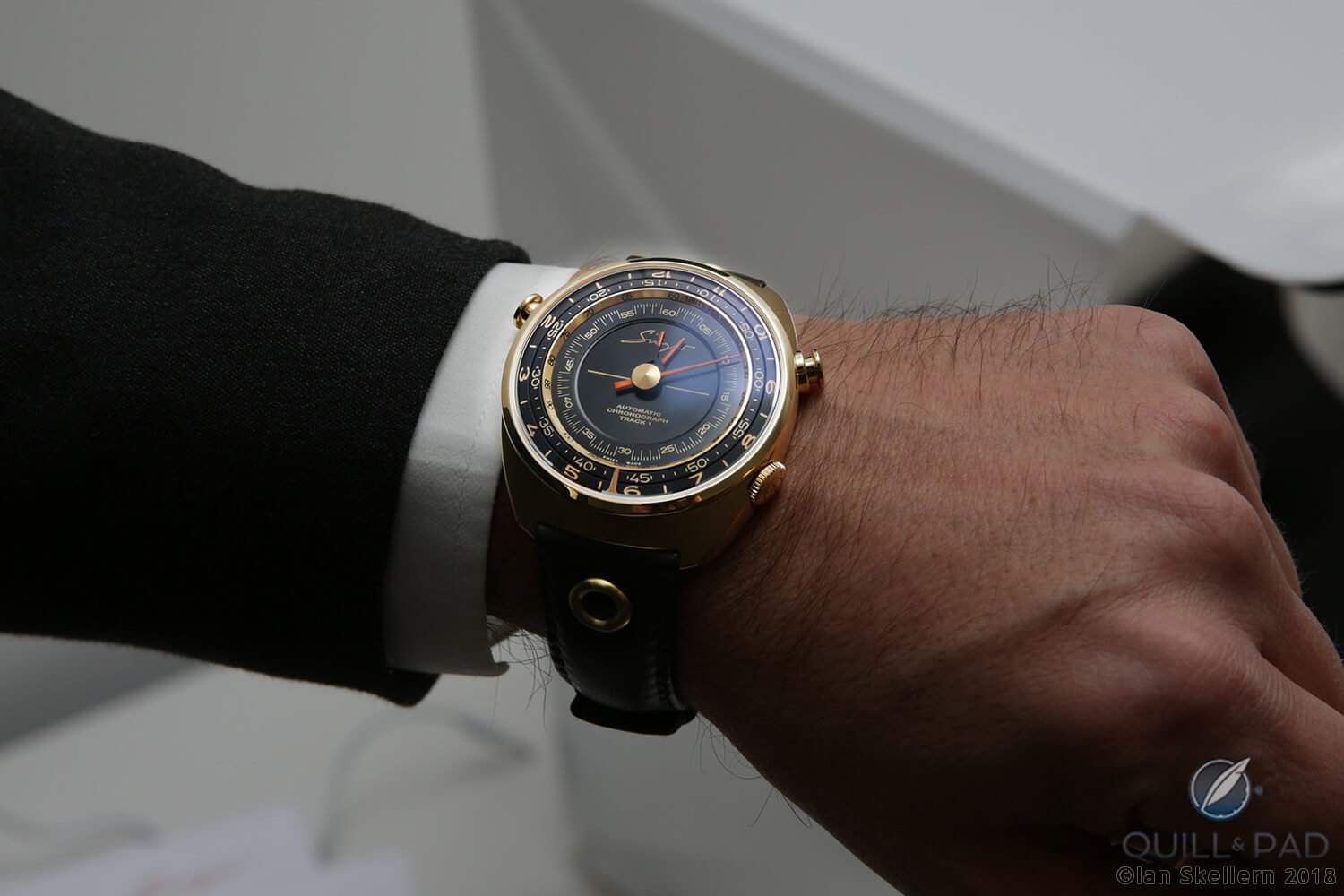
Singer Reimagined Track 1 Geneva Edition in pale yellow gold
For more information, please visit www.singerreimagined.com.
Quick Facts Singer Reimagined Track 1
Case: grade 5 titanium, 43 x 15 mm, transparent display back, water resistance 100 meters
Movement: AgenGraphe column wheel chronograph, 60-hour power reserve, automatic winding with peripheral rotor under the dial
Functions: hours and minutes on disks; central coaxial chronograph displaying jumping hours (to 60 hours), jumping minutes and seconds
Price: sold out, 39,800 Swiss francs (excluding taxes)
Quick Facts Singer Reimagined Track 1 Geneva Edition
Case: grade 5 titanium, 43 x 15 mm, transparent display back, water resistance 100 meters
Movement: AgenGraphe column wheel chronograph, 60-hour power reserve, automatic winding with peripheral rotor under the dial
Functions: hours and minutes on disks; central coaxial chronograph displaying jumping hours (to 60 hours), jumping minutes and seconds
Price: 72,000 Swiss francs (excluding taxes)
You might also enjoy:
The AgenGraphe By Agenhor: The Most Significant Chronograph Since . . . Since The Invention Of The Chronograph (With Videos)
A Coaxial Vision Of Time: Fabergé Visionnaire Chronograph
Road & Track article by Sam Smith Flat Sex: Porsche 911 Reimagined by Singer.
* This article was first published in June 2017 at Track 1 By Singer Reimagined Is The World’s Most Advanced ‘Flat 6’ Chronograph: It Might Not Sound Like An Air-Cooled 911, But It Sure Laps Like One! (Live Photos, Fast Cars And Price)



Leave a Reply
Want to join the discussion?Feel free to contribute!